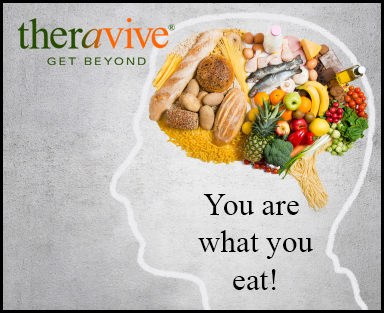Food provides us nutrition and satiates our hunger. As the primary energy source, the very act of consuming our food enables us to function and go about our daily regimen. The human body is no short of a marvel when it comes to converting the food we eat into the energy that we essentially require to survive.
 Importance of Metabolism
Importance of Metabolism
Metabolism is the process the human body has devised to break food into chemical compounds that extract the necessary nutrients that serve as the energy source the body harnesses to perform its various functions. A simple movement of the limbs, a walk in the park, humming our favorite tune – all of these actions that we perform so effortlessly are made possible by this ingenious method that the body has honed over a millennia of evolution.
You Really Are What You Eat
There is a growing body of research that suggests the quality of food we consume has a vital link with our very mental state. Research in this area of study points to the very fact that our eating habits have a huge impact on our mental state. There are many foods that have a positive impact on our brain. There are neurotransmitters in the brain called dopamine that respond favorably when we consume a specific type of food. It is no secret that the body has a chemical craving for certain types of food. Tests have shown that dopamine gets activated whenever we eat food rich in sugar, similar results have also shown the same disposition with chocolate as well. Even though sugary snacks or chocolate are not really rich in nutrition, the tests do show an interesting correlation of the brain with the very food we consume.
Lack of Food Means Lack of Nutrition for the Brain
It could be safely concluded that a healthy diet has a huge implication on our mental state. But what happens when there is a dysfunction in our eating regimen? And what are the far-reaching repercussions of our eating patterns on our mental state? Eating profusely or losing our appetite is a very strong symptom of the sudden onset of anxiety and disorder. It is no secret that people experiencing a strong bout of apprehension also indulge in binge eating or forgoing food altogether. This tends to turn into a vicious cycle whereby the body already beset by stress hormones is robbed of the necessary nutrition to cope with its ailments. If no corrective action is taken, the symptoms may worsen and further worsen the predicament of the individual.
Eating Disorders
Anorexia and Bulimia are the two most notorious eating disorders known to affect millions of people across the globe. They are clearly the worst manifestation of eating disorders and signify how interlinked our diet is with our cognitive functions. Many adolescent girls in their dream to achieve a slim and slender figure develop an unnatural aversion to food. The constant anxiety that even a small portion of the food may add undesirable weight degenerates into an obsessive-compulsive disorder with severe implications for the body. Bulimia, in the same vein is a closely related disorder where the afflicted go on a binge-eating spree and then immediately after consuming the food try to vomit it out. The disorder is characterized with the afflicted person being reduced to a skeletal figure but still repulsed by the idea of having a wholesome meal.
Keep Health Problems at Bay
Cutting back on calories, eating in moderation and consuming healthy foods rich in nutrition is the prescribed method of maintaining a healthy dietary regimen. But some people tend to go overboard in such endeavors and in the process, develop unhealthy eating disorders with the progression of time. The first step towards resolution is to go to the very root of anxiety and try confronting it by seeking the support of family and loved ones. If the need arises, the help of a medical practitioner should be sought. There are many effective therapies that help an individual effectively get past the fear of gaining weight.
 How to Eat Healthy
How to Eat Healthy
Food and our state of mental wellbeing are inextricably linked. That is why it is of primary importance that eating healthy must take a priority in our lives. One cannot stress enough the importance of exercise and fitness in bringing about a necessary balance. Not only do excess calories get burned by working out, our body also gets in shape, adding a pleasant aesthetic appeal to us. Gluttony rather than food is the primary cause of weight gain. Eating right and exercising is and will always be the surest way to keep a healthy physical and consequentially healthy mental state.
_________________________________________________________________________________________________________________________________
Orenstein, B. (2010 May, 10). The Dangers of Eating Disorders. Retrieved May 14, 2014, from http://www.everydayhealth.com
Ekern, J. (2014 April, 19). Eating Disorders: Causes, Symptoms, Signs & Treatment Help. Retrieved May 13, 2014, from http://www.eatingdisorderhope.com
Chavez, M. (2008 February, 4). Eating Disorders: National Institute of Mental Health’s Perspective. Retrieved May 13, 2014, from http://www.ncbi.nlm.nih.gov/
Tracy, N. (2012 January, 14). Effects of Binge Eating Disorder on Compulsive Overeaters. Retrieved May 13, 2014, from http://www.healthyplace.com
Edwards, R. (2014 April, 7) Anorexia Nervosa Overview. Retrieved May 13, 2014, from http://www.emedicinehealth.com
Christie Hunter is registered clinical counselor in British Columbia and co-founder of Theravive. She is a certified management accountant. She has a masters of arts in counseling psychology from Liberty University with specialty in marriage and family and a post-graduate specialty in trauma resolution. In 2007 she started Theravive with her husband in order to help make mental health care easily attainable and nonthreatening. She has a passion for gifted children and their education. You can reach Christie at 360-350-8627 or write her at christie - at - theravive.com.